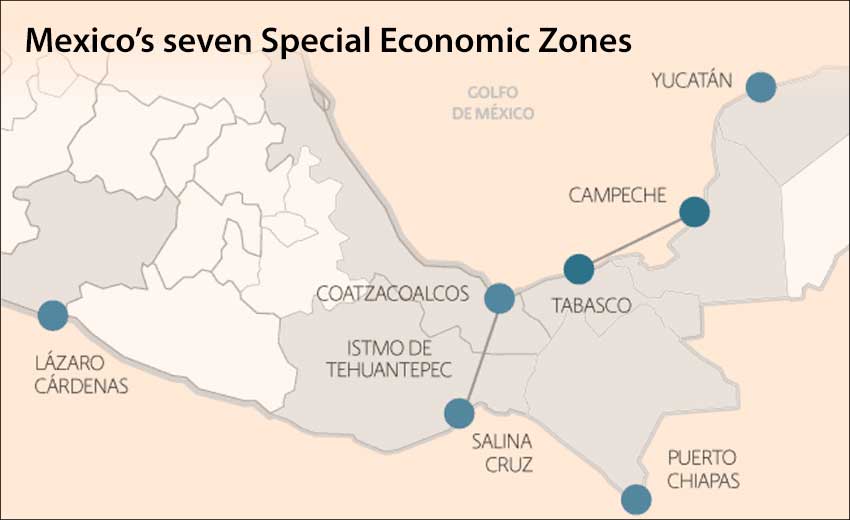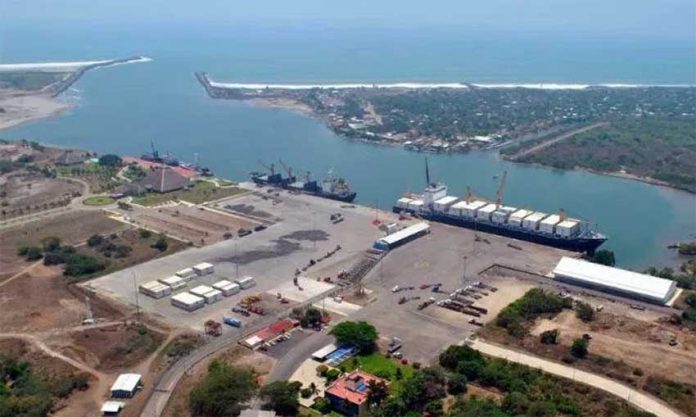The private sector has spoken out against the possible elimination of the country’s Special Economic Zones (SEZs), warning that there is a risk of losing billions of dollars of investment.
The previous federal government created seven SEZs in Puerto Chiapas, Chiapas; Salina Cruz, Oaxaca; Lázaro Cárdenas-La Union, Michoacán and Guerrero; Coatzacoalcos, Veracruz; Seybaplaya, Campeche; Dos Bocas, Tabasco; and Progreso, Yucatán.
Each zone offers generous financial incentives to attract investment including a company tax rate of zero for a period of 10 years.
Some companies have already committed to an investment of US $3 billion and at least 83 others have expressed interested in business ventures worth an additional $8.6 billion that would create tens of thousands of jobs.
Over the next 15 to 20 years, investment of US $42 billion had been predicted by the former head of the federal agency responsible for the SEZs, Gerardo Gutiérrez Candiani.

But his successor said Tuesday that the government is analyzing the viability of maintaining the zones and will make a decision on their future in two months.
Rafael Marín Mollinedo said the Secretariat of Finance (SHCP) has taken the view that it will be more beneficial to concentrate government resources on the establishment of a trade corridor on the Isthmus of Tehuantepec.
“There are experts who have come to speak to us about the SEZs, the World Bank, the Inter-American Development Bank . . . [who say] establishing one SEZ is good, two maximum, but seven? . . . What has to be done is completely develop one area as will be the case with the Isthmus of Tehuantepec,” he said.
Finance undersecretary Arturo Herrera appeared to indicate that the government has already made the decision to cancel the SEZs.
“The [special] economic zones haven’t been working. Little by little, we’re going to move to another model . . . or we’re going to seek different development mechanisms,” he said.
Enoch Castellano Férez, president of the National Chamber for Industrial Transformation (Canacintra), responded to the comments by saying that cancelling the SEZs would be bad news for Mexico’s poorest states because they will lose a huge amount of private investment.
He also contended that the government has a misguided view about how much it will need to spend on the zones.
“I believe that it’s not being measured well. We’ve spoken about it with some officials, [and] I have the impression that they believe that a lot of investment needs to be put into the SEZs,” Castellano said.
“There will be some that do need that but it’s very clear that in Coatzacoalcos, Salina Cruz, Lázaro Cárdenas and even Tapachula [Puerto Chiapas], the investment [required] from the government is a lot less than any of the other projects of this administration,” he added.
Former SZE chief Gutiérrez, who used to be head of the Business Coordinating Council (CCE), told the newspaper Milenio that a lot of investment projects planned for the SEZs are on the verge of beginning and that the government would be unwise not to take advantage of the economic initiative.
He pointed out that the SEZs were designed to create jobs and attract investment and thus close the economic gap that exists between the south and southeast of Mexico and other regions of the country.
Business people and associations in Michoacán and Veracruz also rejected the possible elimination of the SEZs and urged the government to reconsider its intentions.
Jesús Melgoza, secretary of economic development in Michoacán, said he will meet next Monday with his counterparts from all of the states with designated SEZs in order to develop a formal proposal that they will submit to the federal government to advocate for the continuation of the zones.
Michoacán Governor Silvano Aureoles said that if the government cancels the SEZs, it would be shooting itself in the foot, adding that he didn’t understand why “many officials of the current government want to destroy everything.”
Chiapas Economy Secretary Yamil Melgar Bravo said the SEZs will be a trigger for industrial development and expressed confidence that they won’t be cancelled. The SHCP is simply reassessing how to move forward with their development, he said.
Source: Milenio (sp)
